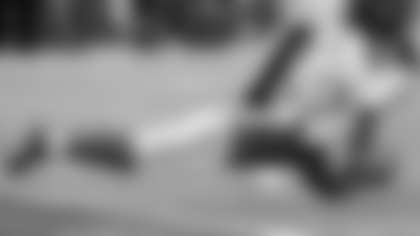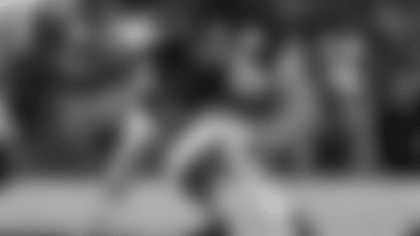Transcript of head coach Eric Mangini's news conference before Friday's afternoon training camp practice:
We released Jerry Mackey and we signed Rodney Kinlaw, who is a running back. We also signed Nate Lyles, a safety who was here with us during the spring. We signed him after the draft.
I spent a lot of time talking with Artrell Hawkins yesterday, and he just felt like it was time for him to move on with the next phase of his life. I've known him a long time, I really like him. I remember the first time we got him from Cincinnati [at New England]. I was into doing stuff late on a Tuesday night, I think it was 10 o'clock, and Artrell was there and he had been there a long time. He was studying. You don't know a guy, you don't know whether it's legit or not, but that's the same pattern that he always followed. He was just a really pleasant surprise. When you get someone off the wire, you just don't know what you're getting.
He was impressive there, and then he was impressive making the transition from corner to safety. So that relationship is long-standing. I have a ton of respect for him and really wish him well in the next phase of his life. He's got that deep Barry White voice so he's talking about going into broadcasting, which I think he'll be good at. He's knowledgeable and very determined, so I'm sure whatever he chooses, it'll be great for him.
Darrelle Revis was just in the hallway talking to Justin Miller, who was giving Revis a hard time about training camp: "What's it like having your first training camp?" So I saw an opportunity to jump in, ask him kind of the same questions. With Darrelle, you never know what you're going to get from your freshman year to your sophomore year, especially if a guy has got a ton of success. And Darrelle really did have a nice season last year for such a young guy. And he's responded in ways, as a coach, you're always excited to see.
He has taken this extra time that he didn't have last year and taken to heart the concept of going out each day and working on some kind of weakness and getting that better. It may not be a glaring weakness. It may be something that you want to refine, training his body and getting his footwork as solid as it can be against a lot of different looks. And he is always challenging receivers. He wants to go against the toughest guy all the time, the toughest route all the time, put himself in those hard situations, so that when he faces them in a game, they're not as hard. He's seen it, and he understands how to deal with it.
And a really good example of that, I forget which day it was but it was an interception he had over by the stands. The day before he had been beaten on that, and it was the backside of a 3-by-1 formation. So three receivers — it was receiver-receiver-tight end — and defense is right, and he was isolated backside, and he had learned from the day before that that was going to be some type of X isolation route and probably be a comeback.
So that's what he processed, that's why he got the jump that he got on it, and that's why he got the pick that he had. And that to me is real progress. For a young guy to take that approach, it's great. He'll keep growing as he keeps working. Also, in the room, he's pushing the group. He has expectations that he has for himself and he has expectations for the group as well, the defensive backs I'm talking about primarily. And it has just really been positive from that perspective.
On whether Revis will start returning punts in games…
That's one of those areas that he's going to need to keep working on. He was back there yesterday morning, put two of them on the ground, and I can't remember if he put one on the ground yesterday evening. I don't think he did. But it was the punt and just applying the Leon [Washington] Rule: If you're back there, you'd better catch it, or else you only get one rep because the rest of the period you're running. So that's an area that we have to keep developing with him. It would be more of a substitution type role or a specialty role as opposed to being the primary guy back there.
On Revis' punt return success in college…
Yeah, he's tough. He did another nice thing, too. We did that ankle-tackling drill that you guys see all the time. He did a nice job. The pursuit was coming inside out, he ran at the guy, stuck his feet, got his feet in the ground and ran away. So he does a lot of things well. You just want to make sure that you space him out so he's not overextended.
On activities during training camp other than practice…
A lot of it is the way that the practice schedule is set up. So for example, on a one-a-day practice, the morning is meetings. Then part of those meetings, the offense will lift, the defense will meet, the defense then will lift and the offense will meet. That early segment of meetings is watching the previous night's film.
And then they have a second round of meetings, which is installing for the practice. We go to that practice, review the practice, first group of meetings, second group of meetings and install. And what we've done is we've taken the walkthrough out of the practice element and that's now built into the install meeting time.
My thought process there was as we do this learning, we study the ways that our players learn percentage-wise. There are a lot of them that are intrinsic learners, which means they have to do it. They get some value from the board but they have to functionally go through whatever the adjustment is. That's just their strength. So I thought by putting it closer to the classroom time that we could gain something there and also shorten the on-the-field time, which is always good as well.
So you have those meetings out of the way. The next day you roll into a two-a-day, so you're right on the field first thing in the morning. The install from the previous night applies there. Then you get off the field, they're able to get a meal in their system and meet there, cleaning up the morning or whatever happened, installing for the evening, then go to the evening. So it's all based on them being able to get review of what happened and install before each practice.
And then also meals between each practice and we tweaked it here and there to fit us. I'm not sure who originally developed it, but I know we introduced it in New England. We were more on the original [training camp schedule] when I was here with Bill [Parcells] and Bill [Belichick], with however many days of two-a-days in a row. At that point it was hard to catch your breath. It was hard to do anything. So I think it was a really good format. And most of the league, I believe, has adopted it.
On the value of players living on campus during training camp…
It's great, because it's all ball. There are so many things going on in the outside world, whether it's your family, whatever the case may be. For us to be concentrating for this amount of time, recenter, refocus, it really lays the groundwork for when we are released back into society [laughter].
On the biggest goal for the Green & White Practice…
The first year we did it at the [Meadowlands] stadium, which I wanted to do, because at that point everybody was new. A lot of people couldn't find their way to the stadium, couldn't find their way to the team hotel. Really when you look at that, a new head coach, a new GM, new staff, new system, new operations guy, new trainer, new equipment man — just take it right off the top, and nobody had done their job in that type of environment. So that was the thought process there, just to get a comfort level with it.
And then I really like that you can't create, as a coach, the stuff that comes up in a game. You try to as much as possible, but every time we throw a certain amount of time on the clock, with a certain amount of timeouts, the scenario is completely different. So this allows you to go through the process of the game, see what happens, put the coaches in some different spots so they can appreciate those roles, put the players in some different spots, sometimes they have to play different spots because there are not as many guys. That builds some versatility and some flexibility.
Get the coaches in the booth so that mechanics happens. Get the players where they're supposed to be on the sideline, be able to see that. Halftime, there's a much shorter halftime in pro football than college, working to adjust to that. Literally go in, get something to drink, do some adjustments and you're back on the field, which is dramatically different for those guys.
So all those different elements, you can talk about them, you can coach them, but I want them to experience it.
On how the teams are chosen for the Green & White Practice…
Really Terry [Bradway] and Mike [Tannenbaum] do the initial one. Then I'll look at it, I'll switch some guys around, and then I'll show it to the coaches and they complain and talk about "Well, I can't do this and I can't do that." So you may make some trades, but both head coaches have to agree upon it to have a trade go through. Then they may get trumped anyway because the commissioner invalidates it [laughter]. So you go through that process, and now with injuries you have to adjust as well.
On the coaches for practice…
It's Bob [Sutton] and Jimmy Raye, I think. They're the two head coaches this time.
On whether it's like a fantasy draft…
Yeah, you trade, and you don't know who's going to get banged up and who can go, who can't go, so that switches everything around. I think we made like four or five changes today. And after today's practice, if someone is ready to go tomorrow, someone might get bumped. Then a coach will complain, "Well, he's got my game plan" [laughter]. But it's fun. There's some stuff on the line, which is always good. It adds a little juice to the practice.
On if the players try to find out who was "drafted" first…
No, there really isn't much of that. They just want to know what's at risk here [smiles], what are we playing for?
On if he has decided the consequences/rewards for performances at the Green and White practice…
Yeah, I've got a good idea what it's going to be. But then I always keep the schedule, or the itinerary and then the magic itinerary. So if things are really good, they get this one [laughter]. If they're moderately good, they get this one.
On whether David Harris or Laveranues Coles will be practicing soon…
Yeah, I think they're both on a relatively short timeline. But those timelines change all the time. I get my update each day, and it looks like its heading one way and then it heads another way. You just don't know. You don't know how it's going to respond. You don't know how an injury is going to test. That's why I anticipate the injuries shouldn't be that prolonged, but I've been wrong about that stuff plenty of times.
On if he indicated to his players that Thursday's evening practice was an improvement from the morning practice…
Yes, I more than indicated. They know I wasn't happy. I thought the afternoon practice was better. You just can't waste days, you can't waste reps and you can't waste periods because it's finite. When you do get into a situation where you're not getting done what you want to get done, and the format that we have set up right now I think really is the best format in terms of efficiency, but we have to get done what we have to get done or you don't have time.
It's not really what I'm looking to do, it's not really what they're looking to do, but everybody has to. We all have to point in the same direction.
On why players have to run laps during practice…
Penalties and any turnovers.
On whether Kellen Clemens has been improving…
The key thing is turning the ball over. He's done a better job protecting the football, which is extremely important. However, this process with training camp, it's really a marathon, not a sprint. You have to look at it day to day, look at the progress, look at where you are at the end of it.
Bill [Belichick] showed a horserace one time in New England. We were 5-5, the Super Bowl year. It was around the first bend he asked somebody, "Well, who's leading?" And somebody said, "Horse 5." And he said, "Well, it really doesn't matter, does it? It really doesn't matter who's leading right here."
The point is that all that matters is where you finish, not how you're running the race. It hit home, and that was the year that we ended up going on the run there and winning the Super Bowl. That's the point, that it doesn't matter where you are necessarily at the quarter mark or whatever, it matters how you finish.
On how he decides whether a mistake is a good play by the offense or a bad play by the defense…
Sometimes it's just your mood. If you're in a great mood, you're excited about the offensive play. If you're in a lousy mood, you're ticked off about the lousy defensive play, or vice versa. Really in training camp you can win on any play, you can lose on any play. It just depends where you're at with it. You'd love everything to balance out, with no mistakes, and the quarterback has the right read and that's where the coverage is light, everybody is blocked up and the blitz hits perfectly. You're correcting as you go. You can view it any way you want.
On if Clemens has to be reminded that the day-to-day at camp is not as important as the big picture…
I think you have to remind everybody about that. That is what I was stressing to the team the other day. It's not about being perfect today. It's about being better than we were yesterday. As long as individually and collectively you're a little bit better each day, then that's how things build.
Eventually you get so much momentum that it hits. So that's what I stress, not just to a guy like Kellen or [Darrelle] Revis or anybody else. It's more of a bigger-picture philosophy. That was really from [John] Wooden's book. He talked about that.
On Eric Smith…
We've had him now for some time, and he's a really bright guy. He has done a really good job on special teams. He got a chance last year to play more defense. I thought overall he had done some positive things, which put him in the position to where he is right now with getting primarily reps with the ones.
Now we're looking for growth. We're looking for growth in communication, growth in his individual techniques. We've got really bright guys in the secondary. There shouldn't be a lot of breakdowns, but that's still going to be a function of whether you talk about it. If I know it and you don't know it, we're just as wrong as if neither of us knew it.
On if the organization is prepared to pay Hawkins a large sum of money to stay out of retirement if he chooses to play again…
[Laughter] We haven't talked through that. You asking that, Mike will probably start running scenarios that we'll discuss tonight. I don't know what the combination of scenarios will be tonight. Rob Ryan used to say, "You hit me with so many combinations, I thought I was a safe." There have been some nights where it's been "All right, Mike, I get it. I'm going to go watch film now."
On David Clowney…
With guys that you don't have as much background on or you don't have as much history with, those guys have to pop. What I mean by that is, you've got to be watching the tape and they can't give you a chance to go through the whole tape without noticing them. They've got to pop off the screen.
Suddenly, you don't know a guy, and he pops one day. You look a little closer at the next play and then he's popping a couple other days. Now suddenly it gets into the conversation. And the more that you pop, the more that we're giving you opportunities to pop.
Clowney has popped. He popped in OTAs and in training camp. Now it has to be consistent, too. You hit one and then suddenly you disappear for a few weeks, it was nice while it lasted.
On Clowney's improvement…
I know exactly why it is. We had this Huddle system where you can study at home, that type of thing. And in the spring, his usage of not the system but the concept of how much he studied, it spiked dramatically. I didn't know it at the time, but I was suddenly looking at him saying, "David has done a really good job, he's making all the adjustments, he's reading the blitzes." Then as I drilled down a little bit deeper, it was a natural correlation: studying like crazy, working hard at that aspect, combining the physical tools that he has and really understanding the system.
Now he gets a chance to just go play and react. It's not thinking about everything, which can make you as slow as anything else.
On whether he is tired of reviewing Favre scenarios…
There are so many scenarios that I've been tired of a lot of different scenarios over time. I'm tired in general right now. That's where I'm at.














